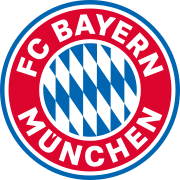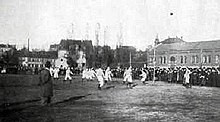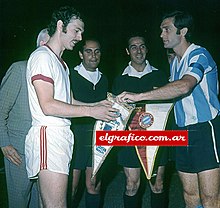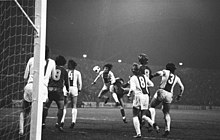Shipping from Europe with tracking number /
FC Bayern Munich
Coordinates: 48°6′6.64″N 11°34′22.00″E
 | ||||
| Full name | Fußball-Club Bayern München e. V. | |||
|---|---|---|---|---|
| Nickname(s) | ||||
| Short name |
| |||
| Founded | 27 February 1900 | |||
| Stadium | Allianz Arena | |||
| Capacity | 75,000[3] | |||
| President | Herbert Hainer | |||
| CEO | Oliver Kahn | |||
| Head coach | Julian Nagelsmann | |||
| League | Bundesliga | |||
| 2021–22 | Bundesliga, 1st of 18 (champions) | |||
| Website | Club website | |||
| Active departments of FC Bayern Munich | ||||||||||||||||||||||||
|---|---|---|---|---|---|---|---|---|---|---|---|---|---|---|---|---|---|---|---|---|---|---|---|---|
| ||||||||||||||||||||||||
| Closed departments of FC Bayern Munich | ||||||||||||||||||||||||
|
Fußball-Club Bayern München e. V. (FCB, pronounced [ˈfuːsbalˌklʊp ˈbaɪɐn ˈmʏnçn̩] (![]() listen)), also known as FC Bayern (pronounced [ˌɛft͡seː ˈbaɪɐn] (
listen)), also known as FC Bayern (pronounced [ˌɛft͡seː ˈbaɪɐn] (![]() listen)), Bayern Munich, or simply Bayern, is a German professional sports club based in Munich, Bavaria. It is best known for its professional men's football team, which plays in the Bundesliga, the top tier of the German football league system. Bayern is the most successful club in German football history, having won a record 32 national titles, including 10 consecutively since 2013, and 20 national cups, along with numerous European honours.
listen)), Bayern Munich, or simply Bayern, is a German professional sports club based in Munich, Bavaria. It is best known for its professional men's football team, which plays in the Bundesliga, the top tier of the German football league system. Bayern is the most successful club in German football history, having won a record 32 national titles, including 10 consecutively since 2013, and 20 national cups, along with numerous European honours.
FC Bayern Munich was founded in 1900 by 11 football players, led by Franz John.[4] Although Bayern won its first national championship in 1932, the club was not selected for the Bundesliga at its inception in 1963. The club had its period of greatest success in the mid-1970s when, under the captaincy of Franz Beckenbauer, it won the European Cup three consecutive times (1974–1976). Overall, Bayern have won six European Cup/UEFA Champions League titles (a German record), winning their sixth title in the 2020 final as part of the Treble, after which it became only the second European club to achieve the feat twice. Bayern has also won one UEFA Cup, one European Cup Winners' Cup, two UEFA Super Cups, two FIFA Club World Cups and two Intercontinental Cups, making it one of the most successful European clubs internationally and the only German club to have won both international titles. Bayern players have accumulated five Ballon d'Or awards, two The Best FIFA Men's Player awards, four European Golden Shoe, and three UEFA Men's Player of the Year awards including UEFA Club Footballer of the Year.
By winning the 2020 FIFA Club World Cup, Bayern Munich became only the second club to win the "sextuple" (winning the League, Cup, and Champions League in one season followed by the Domestic Supercup, UEFA Supercup, and Club World Cup in the next season) or all trophies that a club competes for in a given calendar year. Bayern Munich are one of five clubs to have won all three of UEFA's main club competitions, the only German club to achieve that. As of May 2022, Bayern Munich are ranked first in UEFA club rankings. The club has traditional local rivalries with 1860 Munich and 1. FC Nürnberg, as well as with Borussia Dortmund since the mid-1990s.
Since the beginning of the 2005–06 season, Bayern has played its home games at the Allianz Arena. Previously the team had played at Munich's Olympiastadion for 33 years. The team colours are red and white, and the crest shows the white and blue flag of Bavaria. In terms of revenue, Bayern Munich is the largest sports club in Germany and the third highest-earning football club in the world, behind FC Barcelona and Real Madrid, with a value of €634.1 million in 2021.[5] In November 2019, Bayern had 293,000 official members and 4,499 officially registered fan clubs with over 350,000 members. The club has other departments for chess, handball, basketball, gymnastics, bowling, table tennis and senior football with more than 1,100 active members.[6]
History
Early years (1900–1965)
FC Bayern Munich was founded by members of a Munich gymnastics club (MTV 1879). When a congregation of members of MTV 1879 decided on 27 February 1900 that the footballers of the club would not be allowed to join the German Football Association (DFB), 11 members of the football division left the congregation and on the same evening founded Fußball-Club Bayern München. Within a few months, Bayern achieved high-scoring victories against all local rivals, including a 15–0 win against FC Nordstern,[7] and reached the semi-finals of the 1900–01 South German championship.[4] In the following years, the club won some local trophies and in 1910–11 Bayern joined the newly founded "Kreisliga", the first regional Bavarian league. The club won this league in its first year, but did not win it again until the beginning of the First World War in 1914, which halted all football activities in Germany.[8][9] By the end of its first decade of founding, Bayern had attracted its first German national team player, Max Gaberl Gablonsky.[10] By 1920, it had over 700 members, making it the largest football club in Munich.[10]
In the years after the war, Bayern won several regional competitions before winning its first South German championship in 1926, an achievement repeated two years later.[8][11] Its first national title was gained in 1932, when coach Richard "Little Dombi" Kohn led the team to the German championship by defeating Eintracht Frankfurt 2–0 in the final.[8]
The rise of Adolf Hitler to power put an abrupt end to Bayern's development. Club president Kurt Landauer and the coach, both of whom were Jewish, left the country. Many others in the club were also purged. Bayern was taunted as the "Jew's club" while local rival 1860 Munich gained much support. Josef Sauter, who was inaugurated in 1943, was the only NSDAP member as president. After a friendly match in Switzerland, some Bayern players greeted Landauer, who was a spectator, and the club was subject to continued discrimination.[12] Bayern was also affected by the ruling that football players had to be full amateurs again, which led to the move of the gifted young centre-forward Oskar Rohr to Switzerland. In the following years, Bayern could not sustain its role of contender for the national title, achieving mid-table results in its regional league instead.[13]
After the end of the Second World War in 1945, Bayern became a member of the Oberliga Süd, the southern conference of the German first division, which was split five ways at that time. Bayern struggled, hiring and firing 13 coaches between 1945 and 1963. Landauer returned from exile in 1947 and was once again appointed club president, the tenure lasted until 1951. He remains as the club's president with the longest accumulated tenure. Landauer has been deemed as inventor of Bayern as a professional club and his memory is being upheld by the Bayern ultras Schickeria.[14][15] In 1955, the club was relegated but returned to the Oberliga in the following season and won the DFB-Pokal for the first time, beating Fortuna Düsseldorf 1–0 in the final.[16][17]
The club struggled financially, though, verging on bankruptcy at the end of the 1950s. Manufacturer ousted president Reitlinger, who was later convicted for financial irregularities, was ousted in the elections of 1958 by the industrialist Roland Endler. He provided financial stability for the club. Under his reign, Bayern had its best years in the Oberliga.[18] Endler was no longer a candidate in 1962, when Wilhelm Neudecker, who became wealthy in the postwar construction boom, replaced him.
In 1963, the Oberligas in Germany were consolidated into one national league, the Bundesliga. Five teams from the Oberliga South were admitted. The key for qualifying for the Bundesliga was the accumulated record of the last twelve years, where Bayern was only the sixth-ranked club. To boot, local rivals TSV 1860 Munich, ranked seventh, were champions of the last Oberliga-Süd season and were given preference on the basis of this achievement.[19][20] After initial protests of Bayern for alleged mistreatment remained fruitless, president Neudecker rose to the challenge and hired Zlatko Čajkovski, who in 1962 led 1. FC Köln to the national championship. Fielding a team with young talents like Franz Beckenbauer, Gerd Müller and Sepp Maier – who would later be collectively referred to as the axis, they achieved promotion to the Bundesliga in 1965.[17]
The golden years (1965–1979)
In their first Bundesliga season, Bayern finished third and also won the DFB-Pokal. This qualified them for the following year's European Cup Winners' Cup, which they won in a dramatic final against Scottish club Rangers, when Franz Roth scored the decider in a 1–0 extra time victory.[17] In 1967, Bayern retained the DFB-Pokal, but slow overall progress saw Branko Zebec take over as coach. He replaced Bayern's offensive style of play with a more disciplined approach, and in doing so achieved the first league and cup double in Bundesliga history in 1969. Bayern Munich are one of four German clubs to win the Bundesliga and DFB-Pokal in the same season along with Borussia Dortmund, 1. FC Köln and Werder Bremen. Zebec used only 13 players throughout the season.[21]
Udo Lattek took charge in 1970. After winning the DFB-Pokal in his first season, Lattek led Bayern to their third German championship. The deciding match in the 1971–72 season against Schalke 04 was the first match in the new Olympiastadion, and was also the first live televised match in Bundesliga history. Bayern beat Schalke 5–1 and thus claimed the title, also setting several records, including points gained and goals scored.[22] Bayern also won the next two championships, but the zenith was their triumph in the 1974 European Cup Final against Atlético Madrid, which Bayern won 4–0 after a replay.[23] This title – after winning the Cup Winners' trophy 1967 and two semi-finals (1968 and 1972) in that competition – marked the club's breakthrough as a force on the international stage.
During the following years, the team was unsuccessful domestically but defended their European title by defeating Leeds United in the 1975 European Cup Final when Roth and Müller secured victory with late goals. "We came back into the game and scored two lucky goals, so in the end, we were the winners, but we were very, very lucky", stated Franz Beckenbauer. Billy Bremner believed the French referee was "very suspicious". Leeds fans then rioted in Paris and were banned from European football for three years.[24] A year later in Glasgow, Saint-Étienne were defeated by another Roth goal and Bayern became the third club to win the trophy in three consecutive years. The final trophy won by Bayern in this era was the Intercontinental Cup, in which they defeated Brazilian club Cruzeiro over two legs.[25] The rest of the decade was a time of change and saw no further titles for Bayern. In 1977, Franz Beckenbauer left for New York Cosmos and, in 1979, Sepp Maier and Uli Hoeneß retired while Gerd Müller joined the Fort Lauderdale Strikers.[26] Bayerndusel was coined during this period as an expression of either contempt or envy about the sometimes narrow and last-minute wins against other teams.




